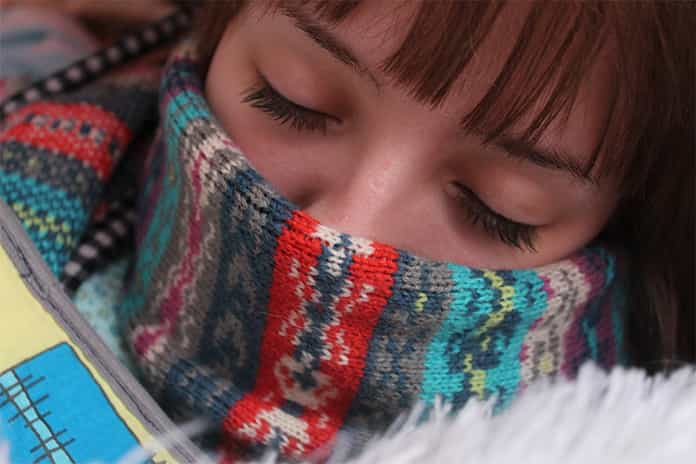In these winter days, when the wind, snow, rain and cold completely soak us in, and all warm clothing seems too little, we must protect ourselves from the cold and its effects.
In this season, viral infections such as cold and flu are frequent, as well as conditions in other parts of the body, such as the joints, and even mental health can be affected.
We tell you about these common winter illnesses and other possible discomforts, and we also offer you some advice against low temperatures.
Table of Contents
Viral Infections: Cold And Flu
They are viral infections, that is, diseases caused by viruses that are also very common in winter. In fact, the cold facilitates the survival of these germs, more than the heat, which eliminates them.
Sometimes the cold causes inflammation in the throat, which is a suitable place for the virus, which is in the environment, to nest and cause a viral infection. Examples of this are colds and flu, which are characteristic winter diseases, whose symptoms are often confused.
Differences Between Cold And Flu
A cold is an inflammation caused by respiratory viruses that affect the upper airway, where the throat and nostrils are located. However, the flu is an infection caused by a specific virus, which causes general discomfort.
The symptoms of a cold or constipation are:
- Stuffy nose
- Discomfort in the pharynx area
- Sneezing
- Eye irritation
- Runny nose
The flu presents the following signs:
- High fever
- Muscle discomfort
- Snot and cough, in some cases
Also Read: How Does Pollution Affect Hair, Skin And Other Parts Of The Body?
When To Take Antibiotics?
Viral infections do not need antibiotics, as our specialist indicates, “they heal on their own with their symptomatic treatment”. This also applies to influenza, which does not have a curative but a palliative treatment of the signs it causes.
It should be added that the administration of antibiotics may be necessary if, in addition, infection occurs in the mouth or in the graves, caused by bacteria present in the environment. This is known as a bacterial infection, which differs from a viral infection by the type of secretions that occur. About this, our specialist points out that “when they change colour or are thicker we associate it with bacterial infections. The same as the whitish plaques of the tonsils, which in most cases are bacterial infections .”
In order to obtain adequate diagnosis and the prescription of an antibiotic, the specialist usually indicates that cultures of the pharyngeal secretions are carried out, which help to check for bacterial growth.
Do I Need To Get A Flu Shot?
The vaccine helps prevent infection in vulnerable people or those with these characteristics:
- Health workers
- Over 65 years
- Chronic diseases, especially cancer patients treated with immunosuppressants
- Chronic lung diseases
- Pregnant
Joint Pain
Low temperatures have a negative effect on the joints. In reference to this, “the exact pathophysiological mechanism is not yet known; however, it is very common for a cold to increase pain and stiffness in patients with arthritis and osteoarthritis. “
Today this effect is related to two possible causes:
- The contractions of the muscle tendons increase with the cold, causing stiffness and discomfort.
- The drop in temperatures and atmospheric pressure cause alterations in the nerve endings that can be associated with pain.
Risk Of Falls
Wet floors, ice sheets, and moisture contribute to an increased risk of falls and slips, especially in the elderly and people with reduced mobility. In addition, as we indicated, the cold tends to cause greater stiffness in the joints, which in older people is accentuated by hindering their movements and increasing the possibility of falls. Therefore, it is important that we exercise extreme caution when we go out into the street and use poles or walkers if we need them.
Seasonal Depression
It is a mental illness that is characterized by its seasonality, and which can be aggravated in winter due to the decrease in daylight hours, a fact that affects the mood of certain people. Precisely, depressive episodes are more frequent in countries where there are few hours of light.
Some key points are that “even in people without pathology, the reduction in hours of daylight lowers mood; fewer hours of daylight are associated with depressive symptoms “In winter, pathologies related to depressive episodes are frequent, among which depression itself is predominant, although there are also cases in which there is an increase in anxiety.
It should be noted that older people are the most affected by this type of depression since they suffer other additional cold-related discomforts, such as bone pain or functional limitations, which make them feel emotionally worse, as our psychiatrist explains: ” pain is usually associated with a decrease in the mood because it complicates their day today.
Watch Out For The Cold!
These tips will help you take extreme care against low temperatures:
- If it is too cold, especially in the early hours of the day and late at night, do not stay on the street.
- Although it seems obvious, wrap up warm when you go out. In this way, you avoid the cold-causing that small irritation in which viruses can cause an infection.
- Drink plenty of water.
- Eat fruit, such as orange, tangerine, kiwi … which have many vitamins that strengthen the body. And follow balanced nutrition.
- Use canes or walkers, in the case of the elderly or people with reduced mobility.
Also Read: Cancer: What Is It, Symptoms, Treatment And Prevention


